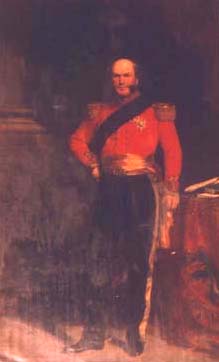George Hay, 8th Marquess of Tweeddale
| The Marquess of Tweeddale | |
|---|---|

The 8th Marquess of Tweeddale
|
|
| Born | 1 February 1787 Bonnington, Scotland |
| Died | 10 October 1876 (aged 89) Yester, Scotland |
| Buried at | Yester, Scotland |
| Allegiance |
|
| Service/branch |
|
| Years of service | 1804 – 1848 |
| Rank | Field Marshal |
| Commands held | Madras Army |
| Battles/wars |
Peninsular War War of 1812 |
| Awards |
Knight of the Order of the Thistle Knight Grand Cross of the Order of the Bath |
Field Marshal George Hay, 8th Marquess of Tweeddale KT GCB (1 February 1787 – 10 October 1876) was a Scottish soldier and administrator. He served as a staff officer in the Peninsular War under Arthur Wellesley and was with Wellesley at the Second Battle of Porto when they crossed the Douro river and routed Marshal Soult's French troops in Porto. Hay also saw action at the Battle of Bussaco and at the Battle of Vitoria. He later served in the War of 1812 and commanded the 100th Regiment of Foot at the Battle of Chippawa when he was taken prisoner of war. He went on to become Governor of Madras and, at the same time, Commander-in-Chief of the Madras Army, in which role he restored the discipline of the army, which had been allowed to fall into a relaxed state.
Born at Yester House the eldest son of George Hay, 7th Marquess of Tweeddale and Lady Hannah Charlotte Maitland (a daughter of James Maitland, 7th Earl of Lauderdale), Hay was educated at the Royal High School in Edinburgh and commissioned as an ensign in the 52nd Light Infantry in June 1804. After succeeding to his father's title as Marquess of Tweeddale in August 1804, he was promoted to lieutenant on 12 October 1804 and, having received his first training under Sir John Moore at Shorncliffe, he served as an aide-de-camp in Sicily in 1806. He transferred to the Grenadier Guards with the rank of lieutenant in the regiment and captain in the Army on 12 May 1807.
...
Wikipedia
